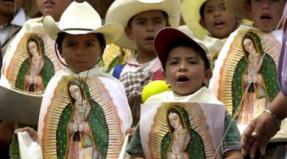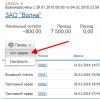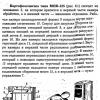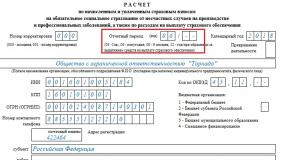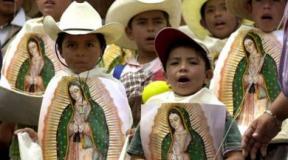Old Believer names. How to choose an Old Church Slavonic name for a boy? History of origin and significance, as well as recommendations for parents
The split of the church in Rus' occurred in the middle of the 17th century, when, on the initiative of Patriarch Nikon, a church reform with the aim of bringing Russian religious rites into conformity with Greek Orthodox traditions. But not everyone accepted the innovations, which gave rise to the Old Believers. The Old Believers still live by their own laws, in particular, they give their children special names.
What names did the Old Believers give?
In the article “On proper names in Russian confessional groups”, Doctor of Philology, Chief Researcher of the Institute of Linguistics of the USSR Academy of Sciences/RAS Nikitina notes: “Intra-confessional and territorial variants of Old Believer culture use spontaneously formed names - a set of the most common names in a given local culture, but common the basis of all local names are the Old Believer calendar.”
So, names were given strictly according to the calendar: for boys within the first eight days, for girls within eight days before or after the date of birth. Therefore, many Old Believers bore names that were rare and almost forgotten in our time, for example: Macarius, Procopius, Savvatiy, Fevrusa, Ulita, Ermilus, Glyceria, Kallistratus, Cornilus, Sekletinya, Hermogenes, Fotinya. Moreover, one family could have several children with the same names - this was not forbidden.
Canonical and non-canonical forms
Ethnographer A.I. Nazarov in his work “Name Book of Old Believers-Priests of the Land of the Ural Cossack Army” draws attention to the fact that in the metric books of Old Believer settlements there are both canonical and non-canonical spellings of individual names. The latter, for example, include such as Aftanom, Anton, Gavrila, Efimy, Mikhaila, Stepan, Fokiy; Nastasya, Anisya, Daria, Arina, Ustina.
“Some names in the registry book for 1833 were found only in a non-canonical form,” the researcher reports, “for example, male names Avinaliy, Anisim, Anufriy, Arefiy, Kirila (Kirilla), female names Alimpiada (Elympiyada), Uliyana (Ulyana), Uliyanna (Ulyaniya). They correspond to the canonical forms Uvenalia, Onesimus, Onuphrius, Arefa, Cyril; Olympiad, Juliana, Juliana."
It is interesting that, according to the Old Believer canons, the name Nikolai is found only in the form Nikola, which existed before the so-called book right in the second half of the 17th century. According to sources, Archpriest Avvakum said on this matter: “Among the Germans there was Nikolai, and under the apostles the heretic was Nikolai, and among the saints there is no Nikolai anywhere.”
How have traditions changed?
According to S.E. Nikitina, although in the Old Believer environment there were often common names - Ivan, Maria, Peter, Anna, Vasily, Tatyana, Pavel, Natalya, along with them there were also less common ones in use - Savely, Evdokia, Karp, Efrosinya, Savvaty, Praskovya, Ulyana, Matryona, Pelageya, Akulina, Fedora, Mavra. Moreover, this happened already in the post-revolutionary period, as evidenced by documentation stored in the village councils of some Old Believer villages in the Urals and Siberia.
Sometimes young people changed their names without permission: for example, Fedora became Faina, Akulina - Lina, Pelageya - Polina, Fotinya - Svetlana (translation from Greek). Adherents of the old faith condemned such behavior: “The name cannot be changed without meaning: it was given according to the book (that is, according to the calendar) and has been tested for centuries.”
Only in the 60s of the twentieth century did the Old Believers begin to call their children names that are more traditional for us, although also available in the calendar - Andrei, Sergei, Anatoly, Ekaterina, Valentina, Galina.
Today, “Old Believers” names are found mainly among people from the Urals and Siberia, as well as among the descendants of Old Believers who emigrated to the West after the revolution. Moreover, S.E. Nikitina notes: “The Old Believer names among Old Believers in America are also striking in their unusualness. Here, for example, are male names: Abraham, Onufriy, Lavren, Nestor, Cyprian - diminutives are not formed from them. Such female names as Minadora and Theoktista also do not have diminutive forms. Those that have them do not always coincide with those familiar to us: Praskovya - Pana, Clement - Mitka, Evdokia - Keya (from the variant of Evdokey), Fetinya - Feta. IN lately“American” names appear as diminutives: Sam (from Samuel), Sally (from Salome, Russian version - Solonka), etc.”
Is it possible to determine that a particular name is Old Believer? It is possible if, apart from the Old Believer calendar, it does not appear anywhere. In other cases, to do this, you should study the history of the ancestors of the bearer of the name.
– the best and most promising electronic version of the Old Believer Monthly Book today.
It is only through our prayers and aspirations that through the efforts of the tireless ascetic, child of the Russian Orthodox Church Maxim Chernyatevich, that a long-term dream came true: to have a “living” version of the church calendar.
Maxim Chernyatevich while working on the calendarAt the end of 2017, this development became available for download as a mobile phone. applications for ANDROID :
 Download Ancient Calendar as applications for ANDROID on Google Play
Download Ancient Calendar as applications for ANDROID on Google Play
The program developed by Maxim calculates Easter for any year, arranges movable holidays, adds data on the rules of bowing and meals, and indicates the days of remembrance of saints honored by our Church. All this is done in strict accordance with pre-schism books, taking into account the practice approved by the Orthodox (Old Believer) Church.

We met Maxim several years ago, when he was completing the work of scanning the Ostroh Bible, the reference Bible for Orthodox Christians, as part of his information portal Vechnoe.info . We mentioned this site as an important source of good information when we talked about it. We still recommend adding the resource to your bookmarks and gleaning useful information from there as needed.

About the project “Ancient Orthodox Calendar”
The purpose of the new resource is to provide Old Believers of all consents with a simple and convenient church calendar containing all the necessary information for church services and home prayer. A simple interface with the ability to integrate with other resources will allow readers to reconcile the way of everyday life with the covenants and tradition of the Church.

The Old Orthodox Old Believer calendar calculates the voices, calculates fasts, moving and fixed holidays, days of remembrance of the dead, arrival and departure bows for each day and Sighted Paschal. It also has the ability to search for holidays on current year or names according to the calendar.
 Most of us have forgotten in 100 years what day the week should begin...
Most of us have forgotten in 100 years what day the week should begin... The calendar is based on an old printed Book of Hours, from which the text about holidays and fasts for every day is taken. In addition, holidays from the Russian Orthodox Church calendar have been added (in the next version it will be possible to configure the calendar for individual consent).

In case of discrepancies between the current practice and the Church Eye, preference was given to the Church Eye, and always in the direction of greater severity, since it is more correct to warn than to allow.
Easter algorithms, algorithms for calculating dates of the Julian and Gregorian calendars are taken from the work of Klaus Tondering "Frequently asked questions about calendars".
The calendar covers the periods from 1900 to 2099, but if necessary, the restriction can be removed. Other useful functions are planned for implementation that will certainly appeal to users.
 With the help of the editors of the “Old Believer Thought” site, an additional program was developed that allows you to embed the calendar into other sites. Now it is available on the site in article reading mode, but it will soon appear on home page as an extended menu.
With the help of the editors of the “Old Believer Thought” site, an additional program was developed that allows you to embed the calendar into other sites. Now it is available on the site in article reading mode, but it will soon appear on home page as an extended menu.
Like any new one software product, the calendar may contain errors and inaccuracies, as well as controversial issues. Maxim Chernyatevich appeals to all readers of the site “Old Believer Thought” with a request not to remain indifferent and to inform us about their questions, doubts and wishes. This can be done in the form of a comment to this article, or by e-mail staroveru@site, [email protected].
Anyone who would like to join the Ancient Calendar project, including posting it on their websites, must coordinate their participation with the developer.
We wish everyone who has worked for the glory of God, in particular R.B. To Maxim, Ivan, Olga, good health and spiritual salvation!
Website editors
Alphabetical lists of the names of saints mentioned in modern calendars (monthly words) of the Russian Orthodox Old Believer Church:
1) "Orthodox Old Believer church calendar for 2017",
publication of the Metropolis of Moscow and All Rus' of the Russian Orthodox Church (Moscow, Rogozhsky village, 29),
cm. male names (from A to K) male names (from L to Z) female names (from A to Z)
2) "Orthodox Old Believer church calendar for 2016",
with editor and editor-publisher Bishop Zosima of Don and Caucasus (Rostov-on-Don),
Alphabetical list of names of saints from the month book of the Russian Ancient Orthodox Church:
source documents - "Old Orthodox Church Calendar" (for 2009 and 2017), andfounder of the Old Orthodox Patriarchate of Moscow and All Rus' (Moscow, Novokuznetskaya str., 38),
Months of the Russian Orthodox Old Believer Church can be found, for example, on the website “Old Believers of the Mari Region” (http://maristarover.ru/), see link.
Months of the Old Orthodox Pomeranian Church(prepared by the Riga Pomeranian Epiphany Old Believer Community and the Union of Old Believer Parishes of Estonia, published annually on the website "Pomeranian Old Believer", Riga, http://starover-pomorec.eu/, see Monthly Diary for 2016, Monthly Diary for 2017
http://www.endzeli-starover.com/Monthsword Angel Pomeranian Old Believers Community (Old Orthodox Pomeranian Church of Latvia)
Which is correct: Old Believer or Old Believer? WITH beliefs about oneself (sociolinguistic aspect).// The article was published in the journal "RUDN University Bulletin", series "Language Theory. Semiotics. Semantics", 2012, No. 3, pp. 96-104 // Author N.V. Ivanova, Department of Russian and Slavic Studies, Daugavpils University (Latvia) // An analysis of various points of view on the Old Believers is presented: the official one, recorded in Russian language dictionaries; points of view of representatives of other faiths; viewsOld Believers against themselves, .
About the names of the Old Believers of the Urals and Siberia, as well as the descendants of settlers in Canada and the USA.Many naming traditions were in Soviet years“cut down with an axe” almost literally. A large array of names moved into the category " rare names", and many Russian names have almost completely fallen into disuse. It turned out to be possible to search for what was lost among the Old Believers of the Urals and Siberia, as well as among the descendants of immigrants to Canada and the USA - Russian Old Believers, Doukhobors (Dukhobors) and Molokans, who managed to preserve the heritage of their ancestors, adapting them to modern realities. We offer you an article by the famous linguist Nikitina Serafima Evgenievna “On proper names in Russian confessional groups” (published in 2004) - you will definitely learn something new for yourself! .
This link contains the website of Russian Doukhobors in Canada "Doukhobor Genealogy Website": http://www.doukhobor.org/ (in the Doukhobor Names section you will find interesting material on the topic, and in particular, 1. Russian Male Names Among the Doukhobors, 2. Russian Female Names Among the Doukhobors, 3. English-Russian Name Cross-Index, 4. Russian-English Name Cross-Index, 5. Guide to Doukhobor Names & Naming Practices).
Names of the Old Believers of the Ural Cossack Army
The article “Name Book of Old Believers-Priests of the Land of the Ural Cossack Army” was published in the journal “Questions of Onomastics” (2009, No. 7, pp. 81-99, author Alois Ilyich Nazarov; journal website http://www.onomastics.ru/). The article presents the namebook of the Old Believers-priests of the land of the Ural Cossack Army, extracted from several metric books (1832-1837, 1841) of the Old Believer chapel in Uralsk. Lists of male and female names of the Old Believers of the Ural Cossack Army and Orthodox Christians of the city of Petropavlovsk are given. Read here: abstract, text of the article.
The name of the Old Believer community in the Miory district of the Vitebsk region.
Iset Old Believer names in modern linguistic consciousness: structure, semantics, pragmatics (based on the material of the First All-Russian Census of 1897). Kuznetsova Yanina Leonidovna. Abstract of the dissertation for the competition scientific degree candidate of philological sciences. Specialty 02/10/19 - theory of language. The work was carried out at Tyumen State University (Department of General Linguistics), Tyumen, 2006, .
Female anthroponymicon of the Old Believers of Isetskaya volost late XIX century. Author Kuznetsova Yanina Leonidovna. Published in the collection "Bulletin of Tyumen" state university. Socio-economic and legal research", issue No. 7 / 2006, pp. 138-141, .
Structure and content of the calendar of the Old Believers of the Fedoseyevsky Consent. Author Alla Kamalova (University of Warmia and Masuria, Olsztyn, Poland). Published in the collection “Orthodoxy in the Slavic world: history, culture, language”, pp. 95-113. Publisher: Centrum badań europy wschodniej Uniwersytetu Warmińsko-Mazurskiego w Olsztynie, Olsztyn 2014. ISBN 978-83-61605-30-0. Electronic version of the article (pdf, 10 Mb).
Anthroponymic space of the village of Verkhniy Uimon, Ust-Koksinsky district of the Altai Republic (using the example of proper names). AuthorsT.N. Nikonova, L.I. Tolstykh, N.A. Kulikova. Published in the monograph "Communicative culture of the Old Believers of the Altai Mountains", pp. 138-141. Editorial and publishing department of the Gorno-Altai State University. University, 2014, 104 pp. ISBN 978-5-91425-109-0, .
Grandfather Stepan, Martyan and Mamelfa, or Russian Old Believers in Bolivia / The complete director's version of Sergei Yastrzhembsky's film "Grandfather Stepan, Martyan and Mamelfa, or Russian Old Believers in Bolivia", filmed in 2012 in Bolivia. Shown in 2013 on the “My Planet” channel. The film is preceded by a conversation with Archpriest Leonty Pimenov (Russian Orthodox Old Believers Church). Watch on YouTube, time43 min. 25 sec. https://www.youtube.com/watch?v=IMdgqMg5X28. Interview with S. Yastrzhembsky about this film -.
Russian Old Believers in Uruguay.According to Jewish law, the rite of circumcision was performed on a baby on the eighth day after birth, and the baby was given a name. This rite was performed on the incarnate Son of God “from the Holy Spirit and the Virgin Mary,” and they gave Him the name Jesus, which means Savior. The Lord, the Creator of the law, having performed the rite of circumcision, showed us an example of how to fulfill the Divine decrees. At the same time, the Lord accepted circumcision so that subsequently no one could doubt that He was a true Man, i.e. truly incarnate, and not ghostly, as some heretics taught. In the New Testament, the rite of circumcision gave way to the sacrament of Baptism. // From the Russian Orthodox Church calendar for January 14 (January 1, old style)
Choosing a son's name is a difficult task for all parents. After all, the name will remain with the child for life, it will be his reflection. Therefore, the issue of a name for a boy must be taken seriously. At the moment there are names of different origins in the world Italian names, Kazakh, Greek, Old Russian names of boys and girls. If you decide to give your son an Old Russian name, then our article is just for you.
It should be noted that among the Old Russian names there are a huge number of beautiful and sonorous names, and if used correctly, you can significantly influence the fate of the child, that is, in the process of upbringing, strengthen the positive traits in the child’s character and develop in him good qualities. Princely names are in particular demand among Old Russian names. As a rule, men with names such as Vladimir, Vsevolod, Svyatoslav. The name Yaroslav gives the child a strong masculine character and charisma. There are also good old Russian names for boys, the owners of which were not princes, but were worthy husbands. For example, the name Bogdan (given by God). A boy named Bogdan will be a calm person who knows his worth; integrity and stubbornness are Bogdan’s striking traits. Boris (wrestlers) are smart, achieve great success, are scrupulous, and have a sense of humor. And there are many such old Russian bright and deep-meaning names.
Old Russian names for boys:
Bohumil - dear to God
Krasimir - the beauty of the world
Budislav - be glorious!
Krasislav - the beauty of glory
Boleslav - glorifying
We love - beloved
Belogor - from the White Mountains
Ludimir - bring peace to people
Beloyar - furious
Lyubomil - beloved
Bazhen - God's
Lyubomir - loving world and the world
Bueslav - stork
Lyuborad - pleasing with love
Budimil - be nice!
Lyuboslav - glorifying love
Bogolep - divine
Ladislav - glorifying beauty
Bratislav - brother, friend of glory
Ladislav - glorifying people
Belimir - white, pure
Lubodron - beloved, dear
Bogumir - bring peace to God!
Luceslav - in a ray of glory
Borislav - stormy glory
Lubodar - giver of love
Volodar - giver of will
Ladimir - peace-loving
Vitoslav - glory of life
Peace lover - loving peace
Vlastislav - owner of the world
Milava - sweet, kind
Vladimir - owner of the world
Mlad - young
Vyacheslav - glorifying advice
Mirodar - giver of peace
Venislav - crowned with glory
Milan - sweet, kind
World - worldwide
Myslemir - thinking about the world
Vseslav - illustrious
Moguta - powerful, mighty
Vysheslav - famous; all the glory
Miloslav - sweet glory
Vlastimir - rule the world
Mladen - young
Vsemil - dear to everyone
Milorad - sweet, kind
Verislav - faithful
Hope - hope expectation
Vojislav - glorious warrior
Negomir - gentle and peaceful
Vadim - invited, invited
Found - found
Vladislav - owner of glory
Neroslav - sealer of glory
Vadislav - called
Witty - sharp thinker
Gleb - sweet, affectionate
Ocheslav - desperate glory
Gradibor - force creator
Oleg - light, fast
Gorislav - glorifying the high light
Wonderful - wonderful
Gorisvet - high light
Peresvet - bright
Gostislav - ready glory
Putislav - path of glory
Gradimir - creator of the world
Premislav - accept the glory!
Gift - gift to the world
Pervoslav - ahead of glory
Drogoslav - dear glory
Ratislav - military glory
Dobrava - virtuous, bearer
Radimil - sweet joy
Daroslav - giver of the word
Radey - joy, joyful
Deyan - active, active
Ratibor - chosen warrior
Daromir - giver of peace
Radibor - chosen from the joyful
Dobran - good giver
Ruslav - fair-haired
Daren - gift to the world
Radislav - caring about glory
Dan - given by God
Radim - sweet joy
Drogorad - dear joy
Ratmir - a fighter for peace
Drohomir - dear world
Radosvet - light of joy
Danko - shining, day
Rusimir - Russian World
Divislav - in the radiance of words
Radimir - caring for peace
Daniyar - given for shine
Radovlad - own joy
Dobrolyub - loving goodness
Svetovid - light, holy
Danislav - giver of glory
Svetozar - illuminated by light
Daromysl - thinker, thinker
Svyatoboy - holy fighter, warrior
Dragolub - kind, beloved
Svyatomir - holy world
Dobroslav - glorifying goodness
Svetovik - light
Dragovit - valuing life
Svyatorad - holy joy
Damir - the giver of peace
Tichoslav - quiet glory
Yeseniy - clear sky
Trajan - third son
Zhelan - desirable
Died - peace, tranquility
Zhelislav - desired glory
Touched - tenderness
Zhdanimir - the awaited world
Delight - delight
Zhiteslav - glorifying life
Hranimir - keep the peace
Zlatoslav - golden glory
Khvalimir - glorify the world
Zlatozar - with a clear gaze
Khvalislav - praise the glory
Zvenislav - ringing with glory
Hranislav - keep the glory
Zalazar - because of the azure
Tsvetimir - be the color of the world
Zelislav - very nice
Chudomil - sweet miracle
Zdanimir - creator of the world
Chestimir - honor of the world
Zvenimir - calling for peace
Chestislav - honor the glory
Dawn - rising light
Chtislav - honor the glory
Izheslav - be with glory!
Shchaslav - happy
Igor - militant
Jaromir - be furious in the world
Ivar - tree of life
Yaroslav - shining with glory
Idan - walking, overcoming the path
Jaromil is a nice man
Ivan - to be born, to be born
Yaropolk - furiously up in arms
Krasibor - chosen from the beautiful
Janislav - nice
In ancient times, people believed that there was a magical connection between a person and his name. They believed that without knowing the main name, it was impossible to harm a person. Therefore, children were often given two names: the first - deceptive, known to everyone, and the second - secret, which only those closest to them knew. The secret name was hidden to protect the child from the evil eye and evil spirits. A false name was sometimes deliberately made unattractive to deceive evil spirits.
During adolescence, the ritual of re-naming took place. The young man was named in accordance with the expressed traits and characteristics of character that were manifested by this time.
History of origin
In the pre-Christian era, Slavic names reflected the meaning attached to the naming process. Usually the name carried positive energy and expressed the hopes and wishes of the parents. There are several options for the origin of Slavic names:
- From weather phenomena (Frost, Wind), time of day (Twilight, Zoryan).
- From natural world: fish (Ruff, Catfish), animal (Wolf, Hare), bird (Eagle, Nightingale, Raven).
- According to human qualities (Clever, Good-natured, Silent, Quiet). By character traits: Brave (brave, courageous), Veselin (cheerful, mischievous), Offended (touchy).
- According to external features (Kudryash, Mal, Chernysh). Strong Old Slavic boys could be called: Dubynya (strong, like an oak), Gorislav (steadfast, like a mountain).
- Names from verbs, adverbs (Zhdan, Khoten, Nayden, Daren).
- By birth order: numerals (Pervusha, Vtorak, Tretyak, Shestak, Nine), and ordinal (Elder, Menshak).
- From the pagan gods (Veles, Yarilo).
- Negative names were chosen to protect against the evil eye (Dashing, Zloba, Nezhdan, Durak), or as a reflection of physical disabilities (Kriv, Nevzor, Nekras).
- By occupation, profession - Kozhemyaka, Warrior, Villager. These names look like nicknames, but in fact they are confirmed by surviving documents.
- Names are derived from the names of other peoples. From the ancient German names Hrodrik, Ingvarr, Helg came the ancient Russian Rurik, Igor, Oleg.
- Compound or dibasic names made up of two roots united by a connecting vowel.
Dibasic
Most of the ancient Slavic names are represented by complex two-basic names. One root of such a name defined qualities (strength, power, might, love), and the second root showed the scope of their application (everything, people, good, gods, army). The underlying meaning of such names can be determined intuitively by ear. For example, Bogomil is dear to God, Vsemil is dear to everyone, Kazimir seems to show the world.
 The inclination towards the art of war was conveyed by names with military roots - regiment, war-, rati-:
The inclination towards the art of war was conveyed by names with military roots - regiment, war-, rati-:
- Yaropolk.
- Ratibor.
- Ratislav.
- Vojislav.
Those inclined to study spiritual sciences added the holy root:
- Svyatoslav.
- Svyatomir.
Positive qualities were determined by the roots good-, sweet-, joyful-, loving-:
- Lyubomir.
- Dobrogost.
- Radolub.
Some meanings are already difficult to determine by sound, because the meanings of words have changed. For example, the root -fat meant abundance, wealth:
- Zhiroslav.
- Domazhir.
The root -ostr (ost) meant brave:
- Ostromir.
- Witty.
The root -slav spoke of the princely origin of the name and the upper class. Craftsmen and peasants had the same names with simple suffixes and endings: -l(o), -yat(a), -sh(a), -n(ya):
- Dobroslav - Dobrynya, Dobryata.
- Putislav - Putyata, Putyatya.
- Stanislav - Became.
- Mstislav - Mestila, Mistyasha.
Evolution
 Many names of ancient Slavic men were lost after the arrival of Christianity in Rus'. To replace Slavic pagan gods with Christianity came one God. With the change in faith, there was a rejection of names that included the names of the old gods (Yarilo, Veles). Some ancient Slavic names were banned by the Christian Church.
Many names of ancient Slavic men were lost after the arrival of Christianity in Rus'. To replace Slavic pagan gods with Christianity came one God. With the change in faith, there was a rejection of names that included the names of the old gods (Yarilo, Veles). Some ancient Slavic names were banned by the Christian Church.
Old Slavonic names replaced names from the Bible (Greek, Hebrew, Roman and others). After the adoption of Christianity, children began to be named after Orthodox saints. For example, the ancient name Ivan, which formed the basis of many folk tales and seems to be originally Russian, comes from the Hebrew name John, and appeared after the baptism of Rus'.
Some of the ancient Slavic names remained in use as secular household names; they were used to call a child in the family circle. Some of these names gradually turned into nicknames.
Many ancient names formed the basis of surnames (Nezhdan - Nezhdanov, Volk - Volkov, Nevzor - Nevzorov, Nekras - Nekrasov, Molchan - Molchanov, Zayats - Zaitsev, Tretyak - Tretyakov, Zloba - Zlobov, Putyai - Putin, Orel - Orlov, Ersh - Ershov).
Some Slavic names have survived to this day almost unchanged. Vladimir, Stanislav, Vyacheslav, Vladislav - remain popular and modern today. These names were borne by rulers, princes, generals and governors, so they remained relevant for many centuries. Some Old Slavonic names were canonized by the church, name days were added for them, these names were included in church calendars and remained in use:
- Vladimir.
- Bogdan.
- Vsevolod.
- Vladislav.
- Yaroslav.
Complete list of Old Church Slavonic and their meanings
This is what the ancient names of Russian men meant:
 Bazhen (desired, beloved, God's).
Bazhen (desired, beloved, God's).- Bazan (screamer).
- Bashilo (pampered, mischievous).
- Belimir (white, bright world).
- Belogor (white mountain, sublime).
- Beloslav (white, bright glory).
- Belyai (white, light).
- Berislav (taker of glory).
- Bogdan (given by God).
- Bogolyub (God loving).
- Bogomir (Peace be with God).
- Boleslav (more glorious, most glorious).
- Borimir (fighting for peace).
- Borislav (fighting for glory).
- Bratislav (brother, friend of glory).
- Bronislav (protector of glory).
- Bryachislav (glorious warrior).
- Budimir (awakening, awakening the world).
- Burislav (stormy glory).
- Vadim (arguing, proving).
- Vadimir (attracting, calling).
- Velizar (great dawn, a lot of light).
- Velimir (great, big world).
 Velimudr (knowing).
Velimudr (knowing).- Vesilin (cheerful, cheerful).
- Vladimir (owning the world, striving for harmony).
- Vladislav (owner of fame).
- Vlastimir (ruler over the world).
- Voislav (fighting for glory, glorious warrior).
- Volodar (owner of will, ruler).
- Volga (wonder, hero).
- Vorotislav (returning glory).
- Vsevolod (who owns everything).
- Vseslav (the most glorious, generous).
- Vysheslav (above others in glory, glorified).
- Vyacheslav (most glorious, most glorious).
- Gleb (presented to God, given under the protection of God).
- Gorazd (big, large, skillful).
- Gorislav (blazing in glory).
- Gradomir (creator of the world).
- Gradislav (preserver of glory).
- Gremislav (loudly famous).
- Danislav (let him be glorious).
- Darimir (giver of peace).
- Dobrolyub (kind, loving).
- Dobromil (kind, dear).
 Dobromysl (good-thinking).
Dobromysl (good-thinking).- Dobroslav (glorified by good, glorifying good).
- Dobrynya (kind, daring).
- Dragomil (especially dear, precious).
- Dragomir (treasuring the world, beloved by all).
- Druzhina (friend, comrade, or army, detachment).
- Dusan (mental, spiritual).
- Dukhovlad (possessing the spirit).
- Yeseniy (clear sky, clear).
- Zhdan (desired, expected).
- Zhiteslav (glorifying life).
- Zvyaga (loud).
- Zvenimir (ringing for peace, calling for harmony).
- Zlatan (golden, precious).
- Zlatomir (golden world).
- Zlatoslav (golden glory).
- Izyaslav (who gained fame).
- Izheslav (be with glory).
- Istislav (glorifying the truth).
- Casimir (bringer of peace, tranquility).
- Krasimir (beautiful world).
- Krasislav (beauty of glory).
- Labuta (clumsy, lump).
- Ladimir (pacifying, in harmony with the world).
- Ladislav (glorifying beauty, harmonious).
- Lel (loving, passionate).
 Radiant (radiant, luminous).
Radiant (radiant, luminous).- We love (beloved).
- Lyubomir (loving the world, any world).
- Ljubomysl (loving to think).
- Luboslav (glorifying love).
- Lyudmil (dear to people).
- Mal, Malyuta (small, baby).
- Mieczysław (famous for his sword, glorious warrior, valiant).
- Milan (sweet, gentle).
- Milovan (affectionate, caring).
- Miloslav (sweet glory).
- Mirko (peaceful, calm).
- Miroslav (glorious in the world, glorifying the world).
- Molchan (silent, taciturn).
- Mstislav (irreconcilable, avenging glory, glorious avenger).
- Myslimir (thinking about the world).
- Hope (hope, expectation).
- Negomir (gentle world).
- Nikola (winner, warrior).
- Odinets (the only one, the first in a row).
- Oleg (sacred, dedicated).
- Ostromir (piercing, brave world).
- Witty (sharp-thinking, brave-thinking).
 Overexposure (bright, bright, clear).
Overexposure (bright, bright, clear).- Polkan (strong, quick).
- Polyuda (giant, huge).
- Wonderful (wonderful).
- Putimir (reasonable world, way of peace).
- Putislav (who glorified his path, blessed road).
- Radamir (rejoicing in peace, fighter for peace).
- Radey (joyful, joy).
- Radimir (who cares for peace).
- Radislav (rejoicing in glory, caring for glory).
- Radmil (sweet joy).
- Radosvet (light of joy).
- Ratibor (fearless warrior, winner of the army).
- Rodislav (nice by birth).
- Rostislav (growing glory, grown for glory).
- Svetozar (illuminating with light, illuminated with light).
- Svyatomir (holy world).
- Svyatoslav (sanctified by glory).
- Svyatopolk (fighter for a holy cause, holy army).
- Slawomir (glorifying the world).
- Stanislav (becoming glorious or famous by the camp).
- Stoyan (steadfast, strong).
- Tverdimir (solid world).
 Tvorimir (creating the world).
Tvorimir (creating the world).- Tihomir (quiet, peaceful, tranquil).
- Tichoslav (quiet glory).
- Khotislav (desiring glory, striving for glory).
- Brave (brave).
- Hranislav (guardian of glory).
- Czeslav (famous).
- Chudomil (wonderful, dear).
- Janislav (glorious).
- Jaromir (bright world).
- Yaropolk (bright regiment, powerful army).
- Yaroslav (bright, glorious, glorifying Yarila, the god of the Sun).
Ancient Slavic male names not only sound beautiful, but also have deep roots and sacred meanings. They carry the stamp of energy, culture and traditions of the Slavic people. Choosing Old Slavic male name, parents lay the foundations of spiritual qualities and the direction of your child’s life path, because the traits that the great ancestors possessed will be projected onto the growing boy.
